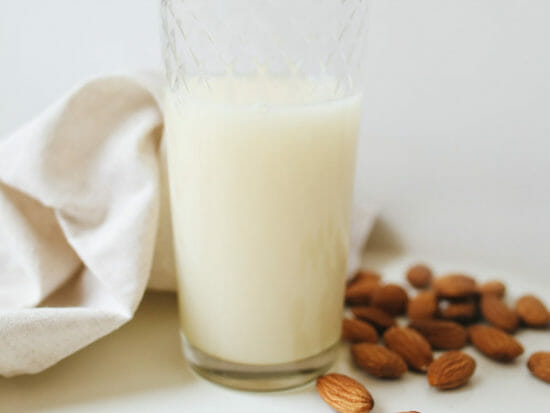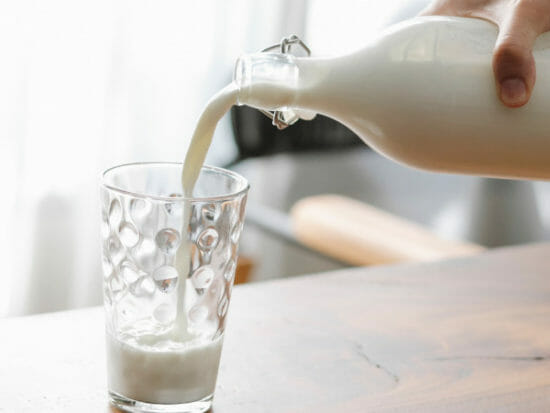Oat milk vs. almond milk – which one is better for you?
As the popularity of plant-based milk continues to rise, many people are opting to replace dairy milk with alternatives like oat milk and almond milk. The question arises: which one is better for you?
Let’s delve into the benefits and drawbacks of oat milk vs. almond milk to determine what suits you best.
Oat Milk vs. Almond Milk

The debate on oat milk vs. almond milk can be tricky because they are both dairy alternatives. Oat milk is plant-based milk, while almond milk is nut-based milk. Both are in the position to become the best alternative to whole milk. However, much like every other food out there, preference still comes into play.
Both options suit those with milk allergies or lactose intolerance. Additionally, people use it in hot chocolate and coffee drinks. Drinkers incorporate oat and almond milk into their healthy diet as it helps to promote strong bones.
Oat milk
Oat milk has been gaining steady popularity since its development in the 1990s. Its thick texture, natural sweetness, and creamy consistency are similar to whole milk. This is why millions of consumers have popularly used it as a substitute. The oaty, slightly nutty flavor is also a crowd favorite.
Pros of Oat Milk
High amounts of fiber and protein
Protein and fiber help lower cholesterol, promote regular bowel movements, and help in muscle building. Oat is naturally high in fiber and protein, making it a great breakfast meal. Oat milk is a great way to ingest your daily need for fiber and protein in one quick go.
Best for coffee and smoothies
Oat milk’s thickness make it the superior choice for coffee and smoothies. Baristas love it because it froths easier and faster than almond milk. It is also good to drink on its own as steamed milk or a tall glass before bed.
More environmentally sustainable
Milled oats mixed with water creates oat milk. Due to its heavier texture, it uses less water and doesn’t need thickening additives. It also produces less waste because oats have been around for a very long time. They are low-maintenance and have a long shelf life.
Cons of Oat Milk
Higher in carbohydrates and calories
One glass of oat milk contains around 130 calories and 25 grams of carbohydrates. If you are on a low-carb diet like keto, you may want to limit your daily or weekly intake of oat milk. It may make you feel full faster, leaving you a bit bloated compared to other milk.
May contain gluten
Oats are naturally gluten-free, but they can be grown or processed in facilities that make other gluten-containing products. Cross-contamination can happen, but certain brands make sure this doesn’t happen. Search for oat milk with the label “certified gluten-free.”
Contains high amounts of sugar and additives
Sugar and preservatives are sometimes added to many commercial brands of oat milk. Those commonly stored in stores likely have these preservatives for a longer shelf-life. Look for unsweetened oat milk for a healthier alternative.
Almond milk
Many people love almond milk because of its taste. It’s close to whole milk but with less fat and cholesterol. People have used it since the Middle Ages and sometimes chose it over cow’s milk due to its longer shelf life.
Manufacturers make almond milk by combining almonds and water, and they may add additional ingredients based on the brand.
Pros of Almond Milk
High in antioxidants
Almonds are a rich source of Vitamin E. It is a good antioxidant that can help fight against carcinogens and slow the signs of aging. The flavonoids in the nuts can also reduce free radicals and boost your overall immune system.
It contains plenty of vitamins and minerals.
One of the best benefits of almond milk is its wide range of vitamins and minerals. Compared to other types of milk, it has a myriad of benefits. These include copper, zinc, magnesium, potassium, and phosphorus.
Good for the heart
Almond milk naturally contains no cholesterol or saturated fats. It won’t damage your cardiovascular health in the long run. It is also high in omega-3 fatty acids to help lower the LDL or the bad cholesterol.
No animal by-products
The production of almond milk involves growing almonds on trees, ensuring that no animal by-products are used during the manufacturing process. You can even make some in your home using a food processor or a blender. Some brands may put additives, so be sure to check the label.
Cons of Almond Milk
Questionable environmental impact
Although the production of almond milk uses the most minor greenhouse gas emissions, it requires plenty of water. It takes 130 pints of water to produce a single glass of almond milk. Water is a huge issue in California, where 80% of the world’s almonds are grown. Farmers are using pesticides to make their crops last longer during droughts.
Not safe for those with tree-nut allergies
Although lactose-free, almonds are still tree nuts. People with nut allergies should be cautious when drinking almond milk. Consult a registered dietitian before making any changes to your diet.
It might not be safe for infants.
Plant-based milk is sometimes less nutrient-dense than whole milk. Processed milk isn’t the same as breast milk or even baby formula. Almond milk isn’t recommended for infants because it lacks the needed vitamins and minerals.
May contain additives
Commercial almond milk often uses thickeners like carrageenan. According to experts, this particular additive may cause inflammation and damage the intestines in the long run. It may contain sugar or other sweeteners because almonds aren’t naturally sweet.
You may also like: Goat Milk: Fully Explained, Benefits and Facts
Other Kinds of Milk
Milk is popular due to its taste, texture, and nutritional value. It provides essential protein, calcium, vitamins, and minerals. Despite the assumption that milk consumption is limited to infancy, people of all ages incorporate milk into their diets through various forms like drinking, smoothies, and food recipes.
Milk alternatives are available for those who cannot tolerate dairy due to lactose intolerance or have a vegan diet. These options cater to individuals seeking a healthy diet, including those with dietary restrictions such as celiac disease or allergies.
Whole or regular milk
Whole milk is most commonly found in grocery and convenience stores. It has a fat percentage of somewhere between 3.25% to 3.5%.
It’s the closest you might get to drinking regular cow’s milk regarding fat percentage. Whole milk has the most calories and cholesterol compared to other types of milk. Some brands also put in added sugar.
Reduced or low-fat milk
Reduced fat and low fat are sometimes interchangeable. Technically, reduced-fat milk has a fat percentage of 2%, while low-fat milk has 1%. They have fewer calories, saturated fat, and cholesterol than whole milk. Unfortunately, they also have less nutritional value as Vitamins A, D, E, and K end up down the drain with the reduced fats.
Skim or no-fat milk
No-fat milk does not contain the same nutritional value as whole or low-fat milk. Its main feature is that it has zero fats, hence, the thin texture of the liquid. It is lighter than your average whole milk consistency.
However, it also contains significantly fewer calories and fat. Some have additives, but not all, so check the label.
Soy milk
As an alternative to dairy milk, soy is a popular type of milk. It is made from soaked soybeans and ground in the water.
Soy contains healthy fats and a lot of protein, roughly the same as whole milk. It also has very little saturated fat and zero cholesterol, perfecting diet restrictions. It also happens to be a lactose-intolerant individual’s best friend.
Nut, plant, and seed-based milk
Another dairy alternative is a nut or seed-based milk like cashew and coconut. Vegan milk is free from cholesterol and saturated fats. They contain plenty of vitamins such as Vitamins B12, C, D, and Zinc because they come from natural ingredients.
However, those who have tree nut allergy be careful drinking these types of milk.
Related Articles
Conclusion
When comparing oat milk vs. almond milk, both are popular alternatives to dairy milk. Oat milk offers a creamy texture. Unlike oat milk, almond milk is known for its taste and longer shelf life. Both options are lower in cholesterol and saturated fats than cow’s milk.
Oat milk is higher in protein and fiber, making it an excellent choice for promoting regular bowel movements and muscle building. Almond milk, conversely, contains high levels of antioxidants and a wide array of vitamins and minerals. Choosing oat and almond milk ultimately depends on personal preference and dietary needs.
Frequently Asked Questions
Which milk is the healthiest: Oat milk vs. almond milk?
The debate between oat milk vs. almond milk requires to be settled when choosing which milk is the healthiest. Since they are two of the most popular milk substitutes, both are good choices compared to whole milk.
Neither oat milk nor almond milk contains no cholesterol or saturated fats. Both have a good list of vitamins and minerals. They also taste good, which makes consumers want them even more. For a healthier option, just try to opt for unsweetened almond milk or oat milk.
Almond milk and oat milk are popular plant-based milk options that offer nutritional benefits. Almond milk, with 31-57 calories per cup, provides a thinner consistency and is typically fortified with beneficial nutrients like vitamin D and vitamin E.
On the other hand, oat milk, with 25-57 calories per cup, has a mild flavor and may be suitable for those following a gluten-free or paleo diet. Both almond milk and oat milk can be part of a healthy diet, offering alternative options for individuals seeking milk alternatives. It’s important to consider personal preferences and dietary needs when choosing between almond milk and oat milk.
Which is more environmentally friendly oat milk or almond milk?
Oat milk is considered more environmentally sustainable than almond milk. Oat milk production requires less water and produces less waste compared to almond milk, making it a more eco-friendly option.
Can oat or almond milk be a suitable replacement for cow’s milk?
Both oat milk and almond milk are suitable replacements for cow’s milk. They are popular alternatives among individuals who are lactose intolerant, follow a vegan or plant-based diet, or simply prefer non-dairy options. However, it’s important to note that the taste and texture of oat and almond milk differ from cow’s milk, so personal preference plays a role in determining the best replacement option.
Published on December 14, 2021. Updated on June 2, 2023.





